There is a special bond a dog has with a child and that is definitely true for the children we see at Phoenix Children’s. More than 25 years ago, we started our Animal-Assisted Therapy (AAT) Program as a way for patients to visit with therapy animals during their stay with us. Over the years, it has grown into the therapeutically based program it is today, where patients can interact with one of our therapy dogs, or cat, to help reduce their stress levels, invoke a sense of well-being and make their stay at Phoenix Children’s a little brighter.
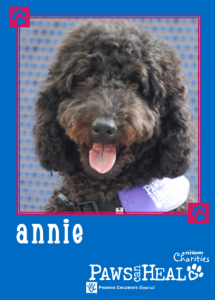
Today, we have “ruffly” (pun intended) 35 therapy dogs and two therapy cats. Prior to the COVID-19 pandemic, we had 50 therapy dogs — a number we hope to get back to soon. The program acts as a catalyst to motivate patients to help themselves. Our patients can take a dog for a walk, play fetch or simply cuddle with them in their bed — allowing them to forget their pain for a little while. Other benefits of our Animal-Assisted Therapy program are the ways it motivates children to:
- Improve their mood
- Interact more with others
- Participate in their treatment
- Forget their discomfort or pain
- Get up, move, walk, leave their room and play
- Improve their interactions with family and staff
- Participate in therapy (physical, occupational and speech)
- Do things that may be a struggle, such as eating, taking medication or waiting
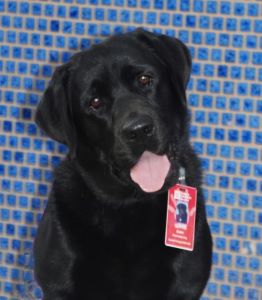
“Having these specially trained animals and their handlers here for our patients creates an environment where kids can do more, more of the things they would do at home, that will help them recover quickly,” said Mary Lou Jennings, Animal-Assisted Therapy program coordinator. “Our families see their kids improve and our patients are able to have fun while they do that hard work of healing. Plus, the animals love having a job to do, and the kids are happy to work with them.”
Recently, the Animal-Assisted Therapy Program hired their first two full-time employed facility dogs, Checkers and Gertie. Both are female black Labradors and were trained by Paws with a Cause, a non-profit service dog organization. The AAT Facility Dog Program is philanthropically funded by the Joy in Childhood Foundation, the Phoenix Children’s Foundation’s WINGS Auxiliary Group and other generous donors. These facility dogs help clinicians make connections with the kids who are nervous or having a hard time opening up.
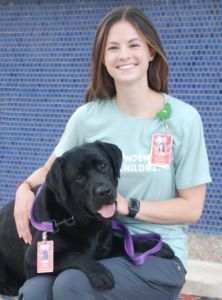
Gertie is 1.5 years old and works alongside Rachel Magsam, facility dog handler and child life specialist. Gertie’s primary role is to help facilitate positive coping with patients at the hospital through building therapeutic relationships, play, emotional support, education, procedure support, and more. The Child Life team at Phoenix Children’s uses a variety of tools and interventions to help patients during their stay and Gertie is now another one of those resources. With her incredibly high level of care and intuition, Gertie makes a great support for patients and families.
“My favorite part about being a child life specialist is seeing how resilient children are and watching them overcome all the challenges they face at the hospital,” said Rachel. “Adding another dimension of care with Gertie will lead to patient and family interactions that are even more impactful.”
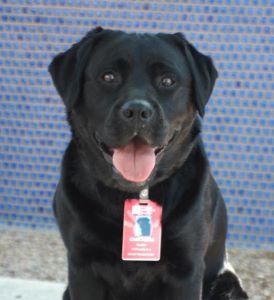
Checkers, who turns 3 soon, works with Lisa Dykeman, facility dog handler and rehabilitation technician. Checkers works in both our inpatient and outpatient rehabilitation centers, helping patients with anything the physical, occupational or speech therapists think will benefit the patient. For example, if a child needs to practice crawling on the ground, Checkers is right by their side crawling next to them. Checkers helps with walking, giving commands, throwing & picking up a ball to help a child practice bending over or leaning down and so much more. Checkers knows over 25 different commands.
“Checkers is such a great motivator,” said Lisa. “A lot of times these kids don’t feel well and it can be difficult for them to put in the work necessary for them to get better, but when Checkers is with them, they work hard and always have a big smile on their face.”
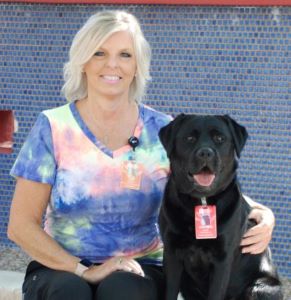
The new facility dogs differ from the volunteer dogs in that they are available 40 hours per week and have a more flexible schedule. They can see patients early in the mornings, late at nights or during the weekends. Also, because they are full-time employees, they can spend more quality time with the patients and build long-term relationships. Our volunteer dogs are limited in their time, and in order for them to see as many patients as possible, they spend approximately 10 minutes with each child. However, our research has shown even this small amount of time has a long-lasting positive effect.
Our volunteer therapy animals and owners are trained and nationally certified and work with the patient's care team to create a session that works toward the patient's treatment goals.
For more information about Animal-Assisted Therapy for your child's stay at the hospital, click here.
For information on how to become involved in the program as a volunteer, click here.
